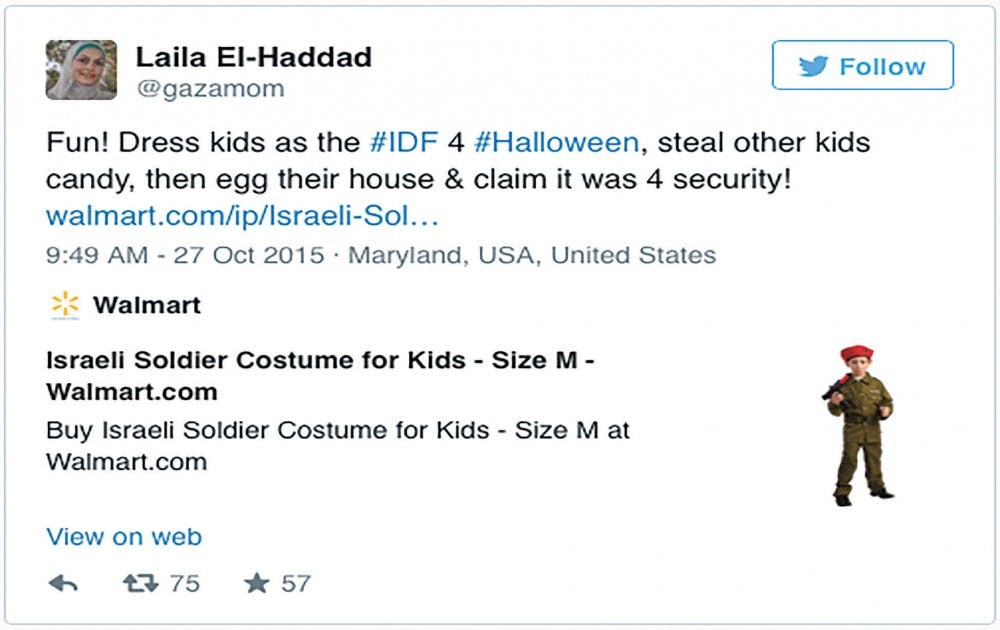Halloween has come and gone and surely you saw some amazing and creative costumes. You probably saw some hilariously bad costumes, too. Did you see any kids wearing an Israeli Defense Force (IDF) costume, by chance?
Most likely not, as Wal-Mart decided to take the children’s costume of an IDF soldier off of its shelves just a week before Halloween. The retail chain came under fire from social media users who deemed the costume offensive and in bad taste. The American-Arab Anti-Discrimination Committee had the following to say about Wal-Mart’s selling of the costume:
“The Israeli forces are a symbol of violence and fear for Palestinians living under occupation. A symbol of fear, violence and a long history of dispossession should not be used for entertainment purposes,” an official statement from the group read.
A pro-Israeli group also had a statement released. “Israeli soldiers are heroes, but Wal-Mart removed an Israeli army costume from their website. Why? They surrendered to a vicious hate campaign — a campaign to demonize Israel.”
Both sides seem to be a bit extreme in their analysis of the costume. Wal-Mart should not be deemed anti-Semitic because of the decision. It was a wise economic move and the company will save face and keep its good public image. However, I think the company should not have caved to the masses.
In today’s world, costumes are increasingly more and more inventive and unique and many people make their own costumes. The mass production of costumes tries to emulate this, but once companies such as Amazon or Wal-Mart start to sell Caitlyn Jenner costumes, the backlash is appropriate. Major companies are foolish for thinking it is a good idea to potentially offend so many people and they deserve every bit of outcry against them.
However, individuals have the right to make their own costumes and if they want to make something offensive, they can. They will simply have to deal with whatever condemnation comes their way. It may be in bad taste, but they should be allowed to do it if they make the costumes themselves.
Many believe Wal-Mart’s IDF costume is offensive and bad. This is simply not the case.
One of the most popular costume ideas for boys is a soldier. In the U.S., many boys tend to dress up as U.S. soldiers from various wars, from the world wars to Vietnam to Desert Storm. As a child I would dress up as a soldier and play with toy guns on days that were not even Halloween. I would do it just for fun. It is simply a thing that children like to do.
U.S. soldiers, in times of war, kill people out of necessity. Should we not allow children to dress up as them? Does this not promote violence and killing?
Of course this IDF costume is Israeli, not American, so the fact that an American retail chain is selling them is a bit incongruous. However, I am sure that many children dress up as foreign soldiers, like Russians or redcoats or even ninjas.
The biggest part of this is the fact that everything Israel does is under a microscope and some Americans are completely against them. They would compare the IDF costume to a Nazi or even a Hitler costume. Israel happens to be one of America’s biggest allies, though, so why should we allow children to dress up as soldiers that have been our enemies in the past, but not allow them to dress up as our current allies? The U.S. funnels millions of dollars into Israeli defense annually.
With the current situation in the Middle East between Palestine and Israel, the costume may seem in poor taste, but it is vital to remember the violence between these two groups is not just coming from the Israeli side.
The costume touches on a controversial subject and it is easy to see why Wal-Mart wants little part in it. However, given how Halloween is celebrated, I do not see how the costume should be banned. I understand why some people would be offended, but I also understand why Israelis would be offended by what seems to be a lack of support from America, though that statement in this situation may be a stretch.



The Slate welcomes thoughtful discussion on all of our stories, but please keep comments civil and on-topic. Read our full guidelines here.